By David Llewellyn-Smith, the founding publisher and former editor-in-chief of The Diplomat magazine, now the Asia Pacific’s leading geo-politics website. He is also the co-author of The Great Crash of 2008 with Ross Garnaut. Cross posted from MacroBusiness
So, global PMIs for November have passed. Where do they suggest that the global economy is heading? Let’s begin with the good news, the US of A. The combined ISM Manufacturing and Services Indexes are below:
The headline figure for manufacturing lifted modestly and it contracted modestly for services. New orders improved for both but so too did inventories. Less promising is that employment for manufacturing collapsed into contraction and services went close as well. Clearly, US businesses are not confident enough about the current bounce to hire into it.
So much for the good news. Let’s cross the Pacific to North Asia where we find China really struggling. We already know about the plunge of the manufacturing PMI from 51 to 47.7 last week. Yesterday we added the Services PMI which recorded a moderate fall from 54.2 to 52.5, still expanding. But the composit PMI that combines the two give you an idea of the current trajectory of the Chinese economy:
That’s 48.9, down from 52.6. Chinese business is not enjoying itself just now. Although, the sub-component employment indexes showed that maufacturing is not yet shedding jobs although the jumping inventory ratios suggest they will shortly, and services are expanding the fastest since June. Authorities have begun to ease the foot off the break but so far, minimally and if we are to take them at their word, it will be a slow easing.
This China slowdown has hit the rest of Asia hard with manufacturing contracting in Japan, Korea and Taiwan. All three reported flat employment indexes.
Swinging to Europe, we know that maufacturing is contracting fast, down from 47.1 in October to 46.4 in November. The employment sub-index reported active job losses as busiensses became more cautious. Last night we added the services PMI and the result was a weak 47.5, slightly up from 46.4 in October.
The core nations of Germany and France added jobs whilst Ireland, Spain and most dramtically Italy shedded jobs. The composit PMI for the Eurozone now looks like it’s projecting a mild recession:
So, where does that leave world growth? First, the global economy for services:
Still expanding at a crappy pace but note the employment index turning negative. Next, the global economy for manufacturing:
Activity contracting with the employment index heading that way as well. That all adds up to this insipid growth:
A flatline in global PMIs within which there has been significent churn, with the EZ and China falling and the US rising.
So, what does all of this say about the global business cycle? Firstly, we’d have to say that without the US, global production would be in big trouble. Everywhere else is slowing swiftly. I’d describe where we are as stall speed for the global economy. In my view, it cannot stay here sustainably. Either employment losses will accererate as businesses seek to claw back profits lost to declining demand or the new stimulus that’s being pumped in will turn demand around, lift production and job creation as inventories fall. Unfortunately, the Eurozone is doing the opposite of stimulus: austerity. Likewise, China’s seeming determination to keep a lid on property is preventing any rapid loosening there too. My bet remains, therefore, that we see further slowing from here into next year irrespective of any credit event that would repeat 2008′s dizzying plunge.
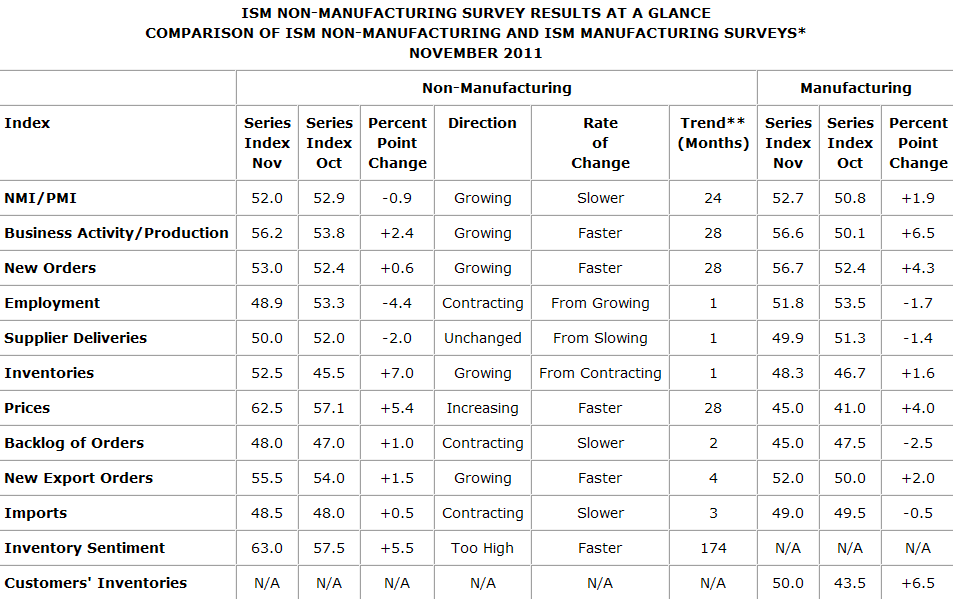
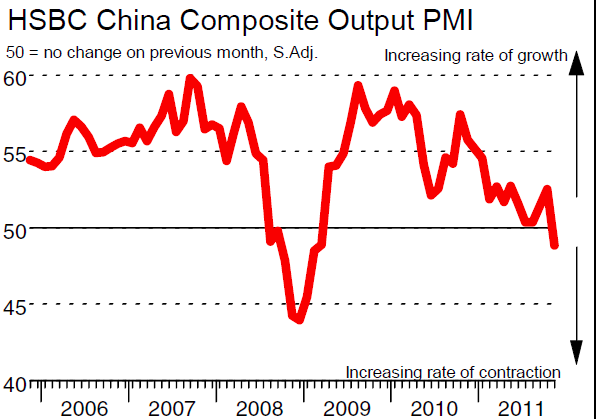
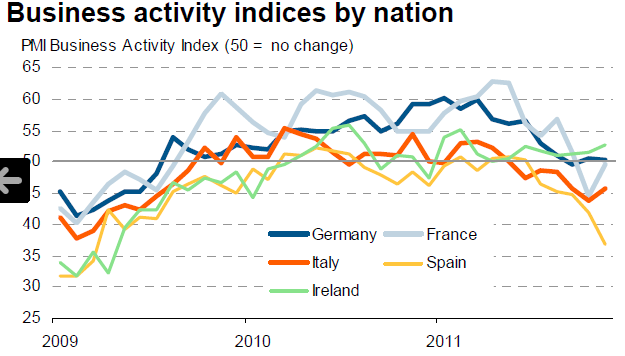
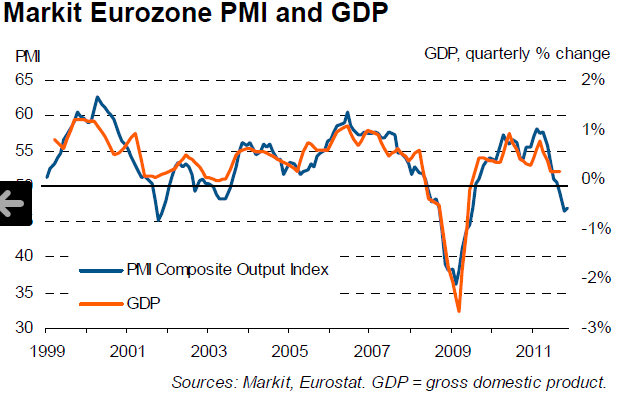
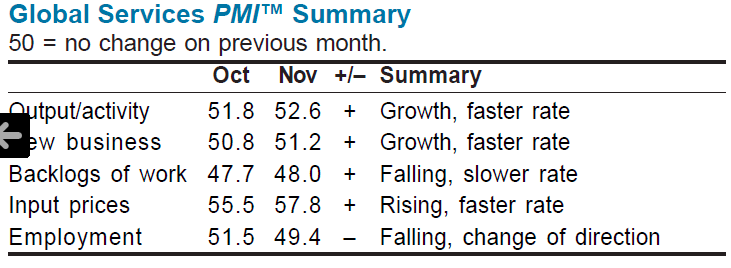
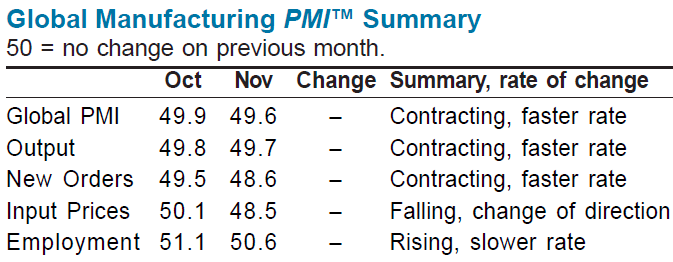
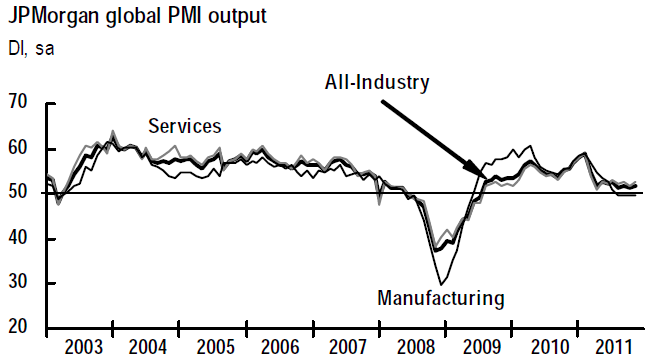


2 Cents:
1) There’s a ton of money coming.
2) Wall Street and US are by far the best positioned for a game of stand on the other guys’ shoulders.
And a nickel:
3) US is going to do much better than expected for the next 2-3 years. Then it goes straight to hell as nobody anywhere did what actually needed to be done.
Two to three years? Won’t last NEARLY that long. Eighteen months (US election cycle + inauguration and grace period) TOPS!
US has played a very calculated “beggar thy neighbor, last man standing” game from the crisis get-go. They won. Money has been and will continue to pour in as Europe wallows in endless fiscal union conflict, Japan runs out of savings, and China starts to seriously wobble. There will be a trickle-down boomlet of sorts in the US, assets other than housing (eg., energy and food) with a strong possibility of another war as well, which while utterly disgusting, is nonetheless a major stimulus, inefficient though it may be. Unemployment will fall into the low “7’s” minimum, with a real prospect of getting down into the “6’s”.
By then, far too late, it begins to dawn on even the dullest of our best and brightest that NONE of this is remotely sustainable. Kersplat.
A lack of a solid model and the jittery behavior of most indicators, all the summarized data appearing in the charts and tables is basically meaningless. One can try to extrapolate as much as one desires, still there doesn’t seem a good basis for even mathematical extrapolation let alone a economic one.
As far as the previous comment goes, there is basically a stand still in the American economy. What does change first, doesn’t amount to much and second, is Fed subsidized. There is no reason to believe that the US will do better the next 2-3 years. Socially, the US society slides fast into a rich and poor dichotomy without much of a middle class. Such a society has no real growth in its future.
So David, I broadly agree with your overall conclusion about economic activities around the globe: at present most of it is going south, so to speak. I’m compelled to raise a broader methodological concern for the sake of accuracy, however, and for those who want an analytical bone to chew on to their own ends. This is not to dispute your conclusions but rather to speak to a different level of analysis of the same processes.
There is no such thing as a ‘global economic cycle.’ There are, to simplify, regional cycles whose effects entrain because they are in the modern economic context highly interactive with each other. Most of the background oscillation underlying these not-quite-periodic cycles are of similar pattern but not exactly in phase. The majority of these regional cycles are consonant in phase over a 30-year kind of pattern; far larger and much less distinct than the economic activity of concern to the analysis in your post, be it said yes. The regional cyclical pattern which runs in a significantly counter-cyclical phase to the rest is the predominant cyclical structure in the USA.
We see this in a naive comparison (naive in the analytical sense) in the kind of data you capture here—US one vector, most of the rest another—though finer grained, and more important longer term, comparisons give support to such a raw interpretation. There is the further complication that economic actions especially and especially actions with a term of, say, three years or less, are impacted with much more weight by current contingencies—Merkel, Election 2012 US, Fukushima, etc.—whereas longer term and non-economic actions are impacted with rather more weight by background oscillations. From that basis, too, the kind of ‘immediate measure’ readings you take here are in some ways more relevant for conclusions of what will happen ‘in the next few month’ than _any_ broader understanding of mass cyclicality, economic or otherwise.
I don’t throw those remarks out incautiously or without years of study behind those contentions. And for the purpose of your analysis here, no it doesn’t matter much to make such broader distinctions. I’d love to have a finished model of this process to put into your (and other) hands, but alas I only have a working model for it, and that unpublished. Reasonably good hypotheses can be made regarding the phasing of the background oscillations to these regional cycles; indeed, I have such hypotheses. The manner in which the background oscillations translate into specific, ‘actionable,’ economic projections is far from clear or simple to analyze. Nor are the interactive effects—moment-rho—between the movement and velocity of regional behaviors simple to analyze, and in fact there are surely stochastic outcomes as well as broadly predictable ones from such interaction.
But I’ll say again, it’s problematic at best to refer to a ‘global cycle,’ and the concept will tend to lead one astray rather than towards a more stable conclusion. Modeling regional cycles with the means you use here, and then comparing them heuristically for interactive potential effects is likely a sounder methodology going forward than summing disparate regions in a global aggregate.
I don’t have the economic knowledge of many here but based on now fuzzy recollections from history I tend to agree. And based on historical precedence of “never letting a good crisis go to waste”, what are the prospects that the US would be able to seize a global economic decline as an opportunity for the “rich to get richer………. while the poor get poorer”. Isn’t that what we do?
So Lucy, “the rich get richer” isn’t economic and it isn’t a cycle: it’s a political economic vector. And yes, it is a constant . . . .
The new logic looks more like a global weather pattern than a global business cycle. Even NASA can’t predict anything out past 10 days.
begin snark
There is money to be made in the growing economy of austerity.
You just need to be part of the global military, police, armament world
You just need to be part of the growing “prison/detention” building and running world.
You just need to be part of the global media/propaganda machine convincing the underlings that they deserve the new world of austerity
You just need to be one of the captains of industry or government puppets for the puppet masters behind the screen.
Competition for these positions may become fierce so start training your children now to have no feelings of compassion or sharing.
End snark
I have to go wash now, I feel so unclean.
Yeah, you definitely made yourself filthy with that post (j/k). I would offer you some soap, but I’m afraid it would corrupt into slime upon touching the fingers that typed those words. Meanwhile, I highly recommend hiring the Catholic priest who is designated to perform exorcisms to deal with your keyboard. You may need to pay him overtime for the service, though, so be prepared.
You forgot the ‘poverty economy’ sector prospects:
the “99-cent only” stores selling expired foodstuffs and housewares made with toxic chemicals (mandating disclosure labeling in CA) are BOOMING here in southern California!
Question is how many meth labs and pot farms can the country (USA) support?
The two fields of endeavor that will thrive in the upcoming interval: elites and criminals.
(Is there a difference?)
Competition for these positions may become fierce…
Silly. Haven’t you heard? There’s going to be a new republican president. No-bid, cost-plus is how they roll. Competition is so… competitive. They don’t put their friends through that meat grinder.
Yes, but you will be competing with your elementary age children for those jobs.
Sorry Lucy;
We’ll be competing with Third World toddlers for the jobs. They are already used to living on subsistance diets.
Psychohisterical could extend his list to include
socks
underwear
alcohol/drugs
oil and gas-with its apt moniker “Greaseball bidnessmen”
gawd. Too bad too few folks have extra pennies to remunerate me or a high school kid as a yard man raking leaves or shovelling snow.
It’s a global race to the bottom
Trickle down
Lookin’ bullish!… LOL
One needs to keep in mind that these very weak economic indicators come despite ultra-loose monetary and fiscal policies throughout most of the developed world.
Only in the Keynesian fantasyland in which we find ourselves would budget deficits of 2%-8% of GDP be considered “austerity”. The four (FED,ECB,BOJ,BOE) most important Central Banks are all at or near zero interest rates and printing money like mad on top of that.
And still the global economy is near “stall speed”. Scary stuff indeed.
Nobody believes. But “markets” ate all those bank downgrades (and threats of sovereign downgrades)like a snack. The money’s on the way. 2% US growth at minimum in H1 2012. Gathering steam in H2.
Don’t know about the business cycle but the increasing impact of kleptocracy in the regional economies certainly looks to slowing economic activity worldwide.
Has the Global Business Cycle Ended?
Short answer; YES
So many charts and graphs. First sign of a fool: they can’t understand plain reason.
The more they “know” the less they understand. Same as it ever was.
There’ll be no explaining “value” to Wall St until after the collapse, after which it will STILL be inexplicable.
Fun times ahead.